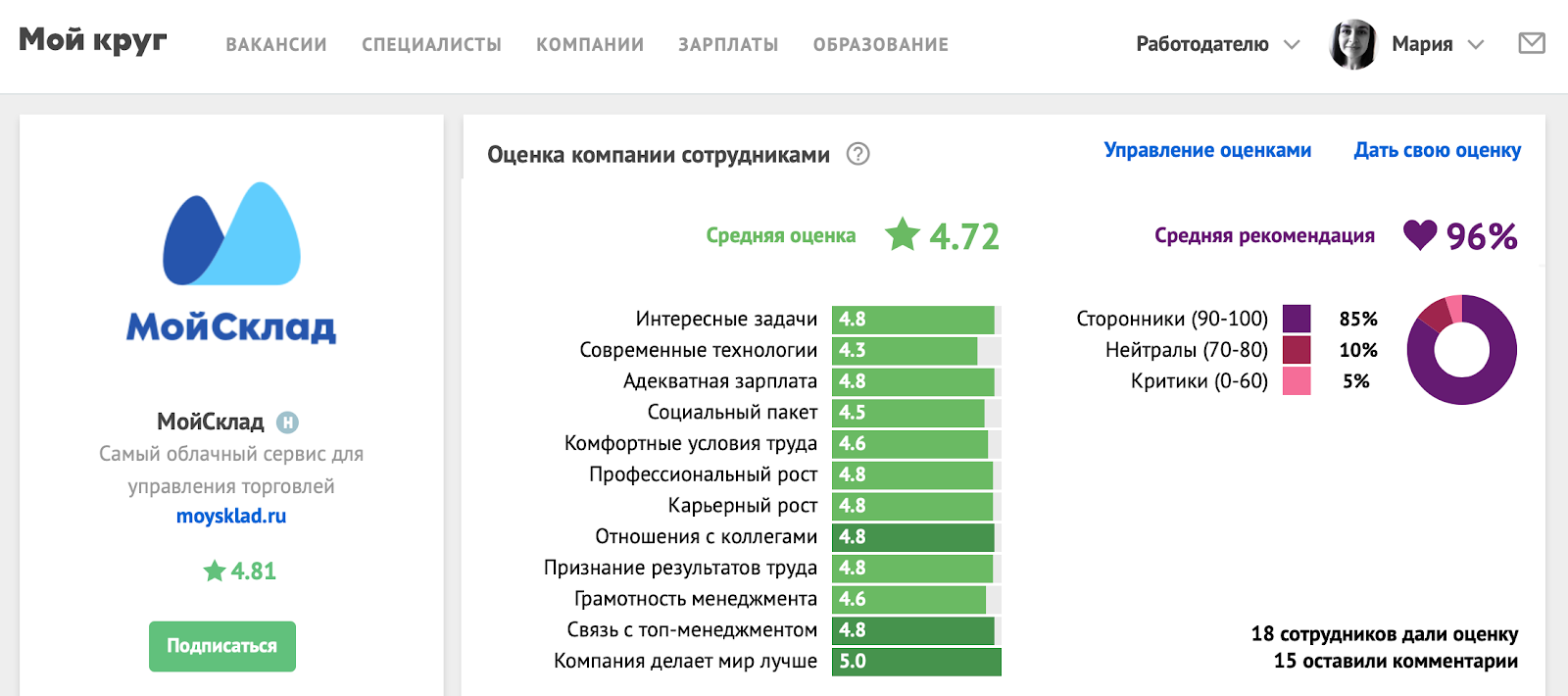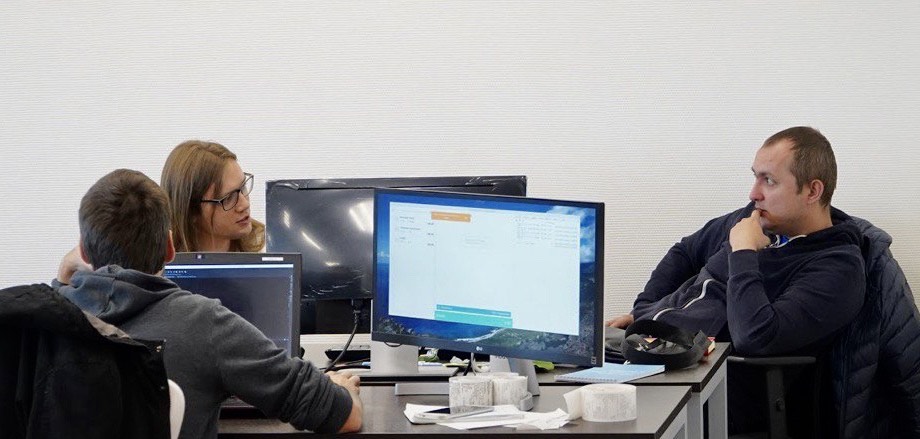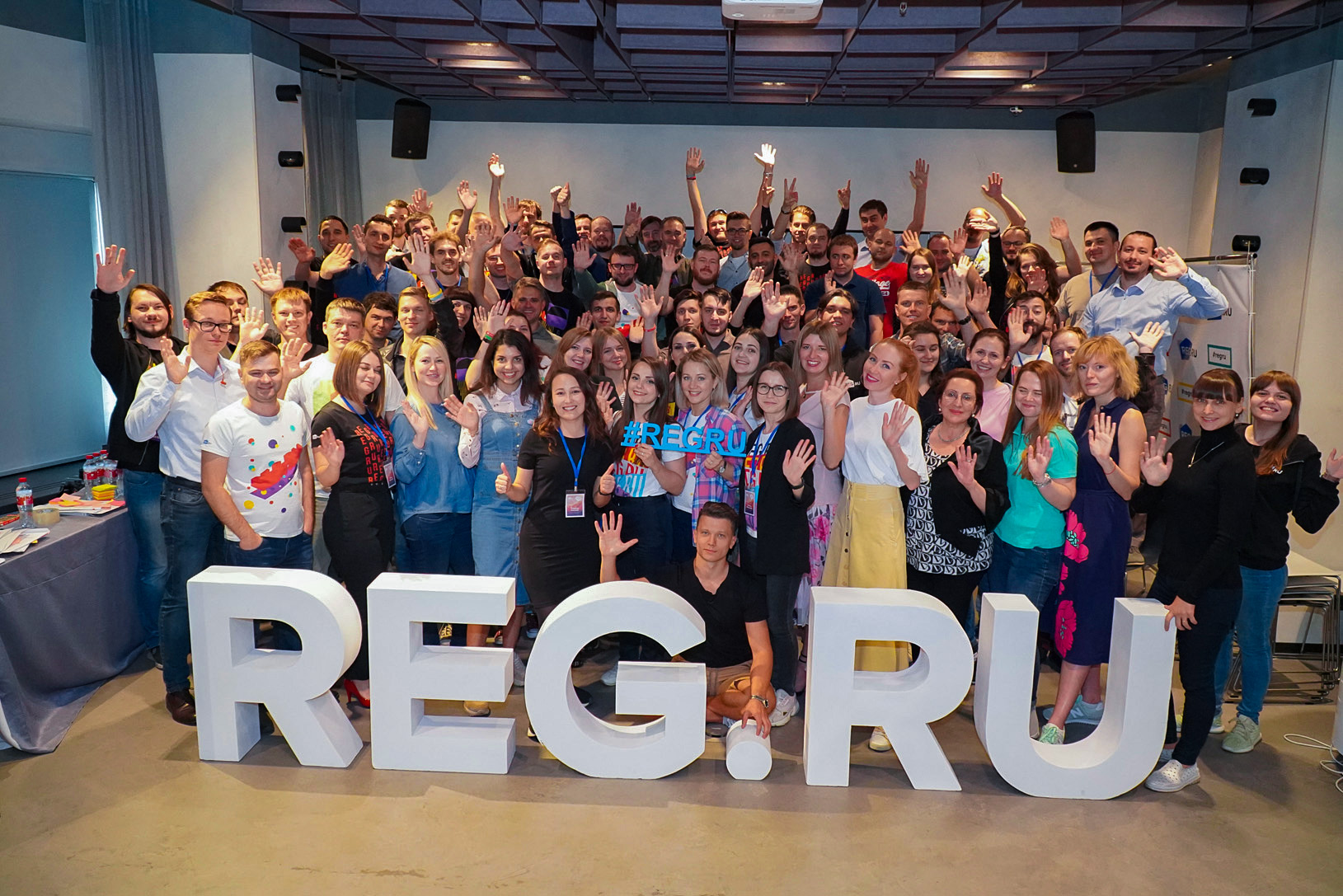
People came up with money for a long time, and it seems that the question of evaluating someone else's work could be closed on this. What I have gained, I received, and rejoice. But it turned out that didn’t work like that. Money has taken for granted. In addition, people need intangible returns from other people.
To understand whether you work well, you need feedback. But feedback is also a dangerous thing. Constant praise may lose touch with reality. From eternal criticism - drop your hands. From complete silence - confusion and burnout ensue.
We talked about finding a balance in this matter with employees of the companies MySklad and REG.RU, who received the highest marks in the
ranking of IT employers My Circle for the criterion “Recognition of labor results”.
“MySklad” is a cloud service for managing trade. The company received at My Circle an average rating of 4.72 out of 5 from its employees, who, in addition to recognizing the results of their work, praised the excellent relations in the team, the connection with top management and the fact that the company makes the world a better place.

Tell me how you get feedback. From end users, from intermediate. What labor results do you rejoice most of all?
Veronika Ilyina, HR Director: I have several “customers”: employees, candidates, gender with technical director. All of them instantly and generously give out negative feedback and, less often, positive. Most of all I rejoice when it turns out to resolve a difficult situation in a team.
Maxim Sukharenko, team lead of the Platform team: Usually you get only negative from end users. He often comes to me in the form of tickets with errors. From colleagues - either in the form of congratulations after a successful release, or close attention to the debriefing if something went wrong.
Vladimir Sarbeev, Android developer: I get feedback both through comments from google play, and from colleagues who directly communicate with users. I am happy with the results that users respond positively to. Those who react negatively - not happy.
Vasiliev Dmitry, senior tester of the Platform team: Feedback - comments on social networks, through technical support, business, analysts, log metrics. Most of all, according to the results of labor - heavy and bloody, but everything was already mixed up here: horses, people. Feature for features like hot cakes. I am happy for the success of the young cadres. There is nothing better than completing a task for 300-500 hours, which will improve the lives of our users.
 Yevtukhova Ekaterina, team lead of the Billing team:
Yevtukhova Ekaterina, team lead of the Billing team: I often read user comments on our social networks. We recently released integration with a new online checkout, and user feedback was positive. Or sometimes positive reviews come across in the comments in support tickets - users write how quickly they were able to use our service to start calculating salaries for employees, or to integrate with the online store. There are no negative reviews, but this is only an indicator that the product is interesting and useful to entrepreneurs, and we can continue to make it even more useful.
Pligin Vladimir, tester of the API team: We receive calls from tech support about user problems, in such cases you need to drop everything and solve them. It is pleasant to read reviews later that everything was decided quickly and clearly - although this is not always the case. It's nice to see how people use our API for their tasks, use our documentation, communicate with us on the developer forum, wait for updates, point out flaws.
Tell me about the situation when your work was clearly not recognized or not noticed. What was the reaction?
Maxim Sukharenko: Faced this at the beginning of his career, when there was a misunderstanding on the scope of work. It was necessary to do a very simple thing, but I got carried away and built a complex solution. Of course, it was a shame. And the more enthusiasm and complexity you do the work, the more offensive it becomes if it is not recognized.
Vladimir Sarbeev: If this happened, I would have thought that I was doing either the wrong thing or the wrong one. But so far it has not been encountered.
Pligin Vladimir: Not so long ago I changed my field of activity and went to the testers. Before that, he was engaged in non-destructive testing. In fact, I also looked for bugs, only not in programs, but in welds. There have been cases when a customer’s representative (usually some factory, developer or research institute) treated our work as something useless or even harmful. The phrase “you catch fleas here, stood for 50 years and stand for another 50” demoralizes very much. A lot of effort went into convincing not-so-smart bosses in the obvious things, which are also spelled out in the law, and for which everyone bears a tremendous responsibility.
If the company has a normal workflow, then firstly, it doesn’t happen that the employee had nothing to do or he was doing something outside, and secondly, it’s impossible to notice (let alone not recognize) someone else’s work. Everyone has their own share of responsibility, everyone knows what to do and why. It should not be otherwise.
What is worse - destructive criticism or ignore?
Vladimir Sarbeev: I think that both options are equally bad. An insufficiently self-confident person will only drop his hands from this. And those who know their worth will spit on everything and leave.
Maxim Sukharenko: It's like choosing between a giant enema and a shit sandwich.
Veronika Ilyina: Worse ignore. Because by destructive criticism you can at least find out the general relation of a person to you / question / task. By ignoring you, obviously, do not know anything and hang in the unknown.
 Vasiliev Dmitry:
Vasiliev Dmitry: Both options are terrible, but destructive criticism is worse, it knocks out morality and a desire to work with a person.
Yevtukhova Ekaterina: Destructive criticism can offend and create a negative atmosphere. Therefore, if it is impossible to criticize reasonably, it is better to ignore.
Pligin Vladimir: Criticism is never destructive. Any criticism is good. The only question is the adequacy of the critic and critic. From any destructive message one can derive the useful, well, and draw a conclusion for oneself about the most critical)
Some people believe that "well done is the most harmful word." What do you think about this?
Veronika Ilyina: If we say "well done" to the fact that a person regularly goes to work, then of course. And it’s always useful to praise for the case; in Russian practice, there is an acute shortage of positive feedback. So at least in the form of the word "well done" it is clearly worth screwing it on.
Maxim Sukharenko: I am sure that people need to be praised. Not just from scratch, but in the right situation and at the right time.
Vladimir Sarbeev: Praising from scratch, perhaps, is not worth it. But if you don’t praise a person at all, then he, again, will come to "I’m doing the wrong thing and not there."
Vasiliev Dmitry: It is possible to recognize and praise in different ways: words, money, deeds. I am not greedy for flattery, but some need recognition and praise, like air, others do not.
Yevtukhova Ekaterina: Getting feedback from colleagues or users is always good, negative or positive. Otherwise, how to understand that your work is useful? Of course, for different people I work different ways of motivation: someone is more pleased with praise, someone - when praise is expressed in monetary terms. But in my opinion, to tell a colleague that he is well done is how to give him candy - it’s not difficult for me, but my colleague is pleased.
Pligin Vladimir: Motivation cannot suffer from praise. I believe that recognition, on the contrary, incites new achievements. And to achieve achievements, you need to work on yourself and discipline, so in itself motivation is a secondary thing. It is needed to determine the vector of development. The absence or presence of the word "well done" can in no way affect motivation.
Have you ever happened that recognition is too relaxing and leads to problems?
Veronika Ilyina: No, maybe I will not be recognized until the end. 8)
Vladimir Sarbeev: I haven’t had such a recognition so that I relaxed too much.
Maxim Sukharenko: Recognition is really relaxing. But sometimes this is exactly what is required after hard work.
Vasiliev Dmitry: The consequences were more likely to hurt - exceptional self-confidence, so it led to problems.
Yevtukhova Ekaterina: And for me, positive feedback about my work is one of the most powerful motivators to do even more and better.
Pligin Vladimir: For me, recognition is when less experienced comrades begin to turn to you for advice. This is an additional interest, the incentive is better to understand your topic. Helping and sharing experiences is always a pleasure.
What recognition should there be in order to have the feeling “now we really have done everything”?
Vasiliev Dmitry: Money, teddy.
Maxim Sukharenko: First of all, you should like the result. If you understand that you haven’t done everything fully, no praise will save you.
Vladimir Sarbeev: If there was a feeling that “did everything”, then we urgently need to drive him away. What about recognition? I believe that it should fully correspond to the reason for which this very “everything” was being done.
Evtukhova Ekaterina: I am very happy when users leave positive comments about new features. Users write support more often when they have problems, and very rarely - to share good reviews. Therefore, if they took the time to praise our product, then we really did everything cool.
Pligin Vladimir: Any project cannot be completed and put on the shelf. Otherwise, it is of little use; therefore, “we have done everything” is a dubious result. Recognition of the quality of work consists in maintaining and developing what has been done.
For what you can agree to an ungrateful job?
Veronika Ilyina: An ungrateful work (one where they do not praise and do not give any feedback at all) can be turned into thankful. I checked. And for the sake of what - for the sake of a cool experience, a cool team, a cool perspective.
Maxim Sukharenko: If it will be interesting to me or I will have no other choice.
Vladimir Sarbeev: For the sake of the opportunity in the foreseeable future to do any work that you like without regard to salary. Money money money.
Vasiliev Dmitry: For the idea, the result.
Yevtukhova Ekaterina: Any work is grateful, there are simply people who do not know how to appreciate other people's work. Each task that I solve is aimed at facilitating the work of our users. And even if it seems boring or routine to me, this does not mean that such work is useless.
Pligin Vladimir: Perhaps for the sake of valuable experience. Gratitude will come from myself from the future, when such experience will be gained and then used. Let the ungrateful employers then search for new workers.
REG.RU is a Russian hosting provider and domain name registrar. Employees rated the company at My Circle on average 4.59 out of 5, noting that REG.RU is making the world a better place, that the team has excellent relationships and that professional development is given due attention.

Tell me how you get feedback. From end users, from intermediate. What labor results do you rejoice most of all?
Vasily Edemsky, Software Testing Engineer: I receive feedback from the customer in formal and informal communication. In addition, our team focuses on customer feedback. Most of all I am pleased with those moments when the information provided by me helps to make a better product.
Oleg Egorov, interface developer: We tested the product among end users. Accordingly, I and our team received feedback from them. It is most pleasant to receive positive feedback about a feature, the implementation of which took a lot of time, and you understand that people appreciated it.
Tell me about the situation when your work was clearly not recognized or not noticed. What was the reaction?
Vasily Edemsky: For some time, tickets with tasks were closed without clearly indicated results of the work done. This led to difficulties in finding out the results of work by other interested parties. I suggested a different approach, involving a detailed analysis and description of the situation when closing a ticket. Initially, this caused doubts among the team, but I gave additional arguments and during the discussions I managed to solve this problem.
 Oleg Egorov:
Oleg Egorov: I do not recall such cases in my work. I think that when it comes to writing code, this situation is possible: a couple of lines can have hours of long work (fixed bug, for example). I believe that it is important to be able to express your opinion. If I came across this, I would ask for feedback on the work done, I would explain my point of view and try to come to a compromise.
What is worse - destructive criticism or ignore?
Vasily Edensky: This is a “context-dependent” thing. Sometimes, after destructive criticism, you can continue the dialogue and agree on something or still hear constructive criticism. Sometimes ignore helps to believe in an idea and realize it faster. For example, when it is not stoked by destructive criticism, taking time and reducing motivation.
Oleg Egorov: If destructive criticism comes from several people over and over again, then in my understanding it is better than ignore. Such criticism may have its premises. If this does not help to solve the problem, then you will at least understand that the person is unhappy and, perhaps, you can find out what is really the reason. If ignored, these emotions could accumulate inside a person and lead to unknown reasons. Better yet, translate criticism into a constructive dialogue.

Some people believe that "well done is the most harmful word." That is, praise and recognition kills motivation. What do you think about this?
Vasily Edemsky: I think that this is also a “context-dependent” thing. In some cases it is, but in others not (I’m sure that you can spend time and find biographies of famous people who were told this word and it didn’t hinder them to reach heights). It is important to understand who they say it, who says it, how often and after what event.
Oleg Egorov: All people are different and each needs its own approach. I think that a good team leader can feel a person and understand how to better communicate with him. Recognition of merit must be present, otherwise a person may come to the conclusion that his work is useless.
Have you ever happened that recognition is too relaxing and leads to problems?
Vasily Edensky: Relaxed - yes, but not too much. It led to problems - no or very, very rare.
Oleg Egorov: No. Perhaps I have not yet received so much recognition. But in my practice, when you understand that your efforts are appreciated, you want to continue to work at the same level.
What recognition should be in order to get the feeling “now we really have done everything”
Vasily Edemsky: Any confession must correspond to what is happening or perfect. For example, when a team released a new feature and everyone positively noted it - from management to customers - this is encouraging.
 Oleg Egorov:
Oleg Egorov: It seems to me that there is rarely a point in the development of a project when “that's it.” In my understanding, any product can develop, transform over time, and there will always be something else that can be done to develop it.
For what you can agree to an ungrateful job?
Vasily Edemsky: If crime is not expected, then for the sake of achieving important personal goals.
Oleg Egorov: If I understand that the result of this work will help change people's lives for the better.
In December, we plan to release a rating of IT companies for 2019, and you can help make it more objective if you give an assessment of the company in which you worked or are working now.
To evaluate the employer, you need to log in to your personal profile on “My Circle”, and if you do not have a profile, but really want to give an assessment - register, indicate your experience in the company and evaluate it.
Ratings are anonymous, you yourself regulate your anonymity by filling out or not filling out the optional form fields.